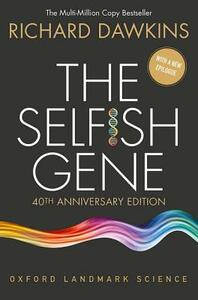You need to sign in or sign up before continuing.
Take a photo of a barcode or cover
I approached this book with caution thinking that it was going to be a typical scientific book filled with overly verbose statements and meanings that I have no idea about, however I was very surprised.
Considering it was first published before i was even born it is still a very good read that, in my view, is aimed at the non-scientific reader. Richard Dawkins breaks down every aspect about genes from their very conception as the replicators from billions of years ago to now and how we are just "survival machines" that facilitate the genes desire to replicate with the outcome being Darwinian natural selection.
Everything is explained in great detail and if you don't fully understand what he is talking about most of the time he reinforces scientific statements with a more basic analogy which cleared it up for me every time.
The book is very well written and I have seen people such as Neil deGrasse Tyson give Richard Dawkins criticism before for not showing passion or getting the point across but I think he absolutely nails it in this book.
I have learned so much from this book that I am now going to work my way through all of his books as I think he is a very talented author and gets his point across brilliantly.
Well worth a read and the very fact that it is still holding its own after forty years says it all.
Excellent
Considering it was first published before i was even born it is still a very good read that, in my view, is aimed at the non-scientific reader. Richard Dawkins breaks down every aspect about genes from their very conception as the replicators from billions of years ago to now and how we are just "survival machines" that facilitate the genes desire to replicate with the outcome being Darwinian natural selection.
Everything is explained in great detail and if you don't fully understand what he is talking about most of the time he reinforces scientific statements with a more basic analogy which cleared it up for me every time.
The book is very well written and I have seen people such as Neil deGrasse Tyson give Richard Dawkins criticism before for not showing passion or getting the point across but I think he absolutely nails it in this book.
I have learned so much from this book that I am now going to work my way through all of his books as I think he is a very talented author and gets his point across brilliantly.
Well worth a read and the very fact that it is still holding its own after forty years says it all.
Excellent
I always find it harder to read non-fiction, especially science books (shame on me) but this was a relatively easy read. I liked this edition because he added many notes to the end, but kept the chapters largely unchanged. He didn't try to cover up his mistakes, but rather acknowledged them and updated his findings.
I first read "The Selfish Gene" about ten years ago. Reading it again I was surprised to find how many of the ideas that seemed original and challenging then are accepted mainstream thought now. It's a testament to the power of Dawkins theories, and to the persuasiveness of his prose.
Dawkins basic thesis is that the elementary unit of selection is the gene, not the organism that houses it. You and I are just complicated meat puppets, temporary homes for genes, built to protect them in this stage of their eons-long sojourn on the planet. That thesis leads to all kinds of interesting conclusions about how and why genes express themselves, and allows Dawkins to provide some convincing explanations for things like altruism.
This is also the book that coined the term meme: the equivalent unit of selection in the infinitely more fluid environment of thought.
If you haven't read this book, and you have any interest in understanding how life came to be, and what it's for, you should probably pick it up now.
Dawkins basic thesis is that the elementary unit of selection is the gene, not the organism that houses it. You and I are just complicated meat puppets, temporary homes for genes, built to protect them in this stage of their eons-long sojourn on the planet. That thesis leads to all kinds of interesting conclusions about how and why genes express themselves, and allows Dawkins to provide some convincing explanations for things like altruism.
This is also the book that coined the term meme: the equivalent unit of selection in the infinitely more fluid environment of thought.
If you haven't read this book, and you have any interest in understanding how life came to be, and what it's for, you should probably pick it up now.
The Selfish Gene is a deep dive in the world of evolution on a genetic scale. At times I felt like I was in over my head, but Dawkins always does a nice job bringing the subject matter down to an understandable level. I listened to the 2011 version on Audible which was narrated by Richard and his wife, British actress Lalla Ward. This version had a new forward and two extra chapters at the end.
The book was originally written in 1976 so Richard included many endnotes to clarify points and update the science from the first edition. He also spends a lot time updating the theories he and his rivals championed in the 1970s, sometimes admitting his missteps and sometimes rebutting his rivals.
The gist of this book is that Dawkins firms up the theory of evolution proposed by Darwin, advancing it with modern information about the inner workings of genes which was unknown during Darwin's time.
Highly recommended to anyone with interest in evolution and biology.
The book was originally written in 1976 so Richard included many endnotes to clarify points and update the science from the first edition. He also spends a lot time updating the theories he and his rivals championed in the 1970s, sometimes admitting his missteps and sometimes rebutting his rivals.
The gist of this book is that Dawkins firms up the theory of evolution proposed by Darwin, advancing it with modern information about the inner workings of genes which was unknown during Darwin's time.
Highly recommended to anyone with interest in evolution and biology.
Given my interest in science, particularly evolutionary biology, it seemed important that I read this classic. But, I regret it. This was dull and repetitive and egotistical. This was the revised edition and, in the audio version, the original version was narrated by one narrator while the revisions and endnotes were narrated by Dawkins. The revisions and endnotes tended to be highly egotistical and self-serving, often putting down the work of other scientists while complimenting the author. It was interesting to note how his ego has increased in the 30 years since the first edition was published. The same subject matter could have been covered in a couple long articles. I suppose the problem with reading the classics in a field once you already are familiar with the subject matter is that much of it seems simplistic, the examples long-winded and unnecessarily detailed. I finished this out of stubbornness and sped the playback speed up to 2x to get through it.
This book was required for a college class and halfway through reading I bought it because I enjoyed it so much. There are so many topics and theories covered that I never knew about or had only brief prior understanding of.
The Selfish Gene is certainly a fascinating book and I can understand why is it so widely regarded and discussed. I probably went into this book with slightly misjudged expectations, which is entirely my own fault, by expecting a study of the case for evolution - this I see Dawkins has more fully addressed in The Greatest Show on Earth. What we get in The Selfish Gene is a very focused discussion on why we, and indeed life in general, may act in altruistic ways. It's this single discussion that is so fully fleshed out in this book that gives birth to the theory of The Selfish Gene.
Some have complained that The Selfish Gene theory de-humanises us and I can certainly see that point. In this theory, Dawkins proposes that the essential element of life - in fact the key metric for life - is the self-replicating gene. Once this is defined we then move on to the concept of replicators and vehicles. In this context humans, or any other complex life form, are not seen as the unit for propagation - instead we humans are merely vehicles for the ongoing propagation of the 'unit' of life, the gene.
Based on the above context Dawkins then goes on, in considerable detail, to demonstrate that it is perfectly plausible for us as humans to act in an altruistic manner in the interest of maintaining the interest of the genes that we are mere vehicles for.
The Selfish Gene is a thought provoking book that will leave you feeling a little more humble in the universe we inhabit.
Some have complained that The Selfish Gene theory de-humanises us and I can certainly see that point. In this theory, Dawkins proposes that the essential element of life - in fact the key metric for life - is the self-replicating gene. Once this is defined we then move on to the concept of replicators and vehicles. In this context humans, or any other complex life form, are not seen as the unit for propagation - instead we humans are merely vehicles for the ongoing propagation of the 'unit' of life, the gene.
Based on the above context Dawkins then goes on, in considerable detail, to demonstrate that it is perfectly plausible for us as humans to act in an altruistic manner in the interest of maintaining the interest of the genes that we are mere vehicles for.
The Selfish Gene is a thought provoking book that will leave you feeling a little more humble in the universe we inhabit.
The Selfish Gene is quite a popularized science book, made entertaining by extravagant writing style and vivid examples. It works for everyone from students and biologists to the general public, which is something Richard Dawkins emphasizes right in the beginning. It´s a bit surprisingly not outdated. A non fiction book about evolution and genetics might thought to have near to no value after forty years due to fast progress made in those fields. But The Selfish Gene is actual to this day and the things it considers are still not universally accepted. For example, the way I got interested in reading it was hearing how highly a lecturer on my evolutionary biology course esteems it, but the other teacher on the same course actually doesn´t agree with the idea that evolution should be seen from the view point of a gene instead of an individual. I wanted to see where I stand myself and in the end I did find Dawkins theories very logical. Also, there are notes added to the chapters that correct the few bits that have changed after the publication and tell about recent discoveries. I love that the original text has not been edited! Overall, Dawkins´ book is everything but dull - he knows how to write enjoyable text while getting his point cross. No wonder that this, and his other publications have been so popular.





